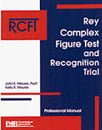
Rey Complex Figure Test and Recognition Trial rcft
For: Measure visuospatial ability and visuospatial memory in ages 6-89 years.
Reading Level: Child - Elder Adult
Format: Paper-and-Pencil
Length: 45 minutes, including a 30 minute delay interval (timed)
Scoring: Hand Scored
Printed Forms & Handscoring Materials
Test forms, response booklets and scoring reference manuals.
Books & Workbooks
Click to browse products
Printed Kits
Click to browse products
RCFT Manual
RCFT Manual Supplement (Child and Adolescent)
RCFT Professional Manual with Manual Supplement
RCFT Test Booklets (50)
RCFT Manual
RCFT Introductory Kit
Author
John E. Meyers, PsyD, Kelly R, Meyers
Description
Results of factor analysis suggest that the RCFT captures five domains of neuropsychological functioning: visuospatial recall memory, visuospatial recognition memory, response bias, processing speed and visuospatial constructional ability. The Recognition trial measures recognition memory for the elements of the Rey complex figure and assesses the respondent’s ability to use cues to retrieve information. The RCFT standardises the materials and procedures for administering the Rey complex figure.
Special Features
The 8.5″ x 11″ Stimulus Card contains a computer-rendered replica of the original Rey complex figure. Prior to this publication, Rey’s original figure had not been available commercially.
Discriminates mildly brain-injured patients from normal patients.
Discriminates brain-damaged patients who have documented memory impairment and are able to live independently from those who are not.
Distinguishes deficient performance due to motor impairment from deficient performance due to memory impairment.
Standardises the complex figure testing materials and procedures.
Includes a Copy trial, a 3-minute Immediate Recall trial, a 30-minute Delayed Recall trial, and the Recognition trial.
Evaluates the relative contributions of encoding, storage, and retrieval processes to memory performance.
Pages for the three freehand drawing trials (Copy, Immediate Recall, and Delayed Recall) and the new Recognition trial are perforated for easy detachment.
Uses a 36-point scoring system to score drawings for all three drawing trials; scoring examples are provided.
Normative data is derived from 601 adults and 505 children and adolescents.
Demographically corrected normative data are presented; U.S. Census-matched normative sample (n = 394) also is provided for comparison of RCFT scores with the general population.
Manual Supplement includes data for children and adolescents; case illustrations aid interpretation.
Test-retest reliability coefficients of the memory scores range from .76-.89.
Inter-rater reliability ranges from .93-.99.
Recognition Trial
The RCFT Recognition Trial is administered immediately after the Delayed Recall trial. The Recognition Trial presents 12 of the 18 scoring elements of the Rey complex figure, along with 12 designs (elements of the Taylor complex figure) that serve as foils. The respondent indicates which items are recognised from the earlier Copy trial. Studies show that the Recognition trial provides incremental diagnostic power compared with using recall trials alone.
Validity
Inter-correlations between the RCFT and other measures, in samples of both normal and neurologically impaired individuals, establish the convergent and discriminant validity of the RCFT as a measure of visuospatial constructional ability (Copy trial) and visuospatial memory (Immediate Recall, Delayed Recall, and Recognition trials).
NB: Prices are in Australian dollars inclusive of GST. NZ customers need to log in to view ex-GST prices.



